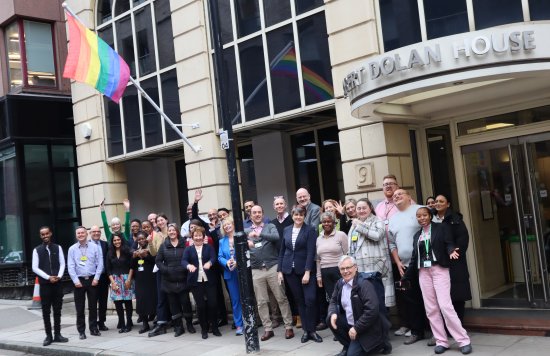Staff and service users gathered on Thursday 23 February to celebrate the unfurling of the rainbow flag at Robert Dolan House, ELFT Headquarters in Aldgate.
The rainbow flag has been flying all month in recognition of LGBTQ+ History Month - and serves as an appropriate time to thank all our LGBTQ+ colleagues, service users and friends for everything they do for ELFT as well as their work or involvement with our partner organisations in the communities we serve.
Statistical evidence continues to show that LGBTQ+ people have disproportionately worse health outcomes and experiences of healthcare.
For this reason, it is important as ever that ELFT, as part of the NHS, works hard to challenge discrimination and celebrate the visibility of LGBTQ+ people, so that progress continues to be made in closing the gap in these health outcomes.
ELFT LGBTQ+ Network Ally Richard Harwin was present at the celebration of the ELFT Rainbow flag at Robert Dolan House. He said:
"I'm both proud and honoured to have been accepted as an ELFT LGBTQ+ Ally Network Lead in 2022.
"Society has come so far, from the gloomy days when to be out as gay, lesbian, trans or bisexual was a very real and ever-present risk to one's physical and mental health.
"But there is still a long way to go.
"A recent survey carried out by the Stonewall Trust found that one in eight LGBTQ+ people (13 percent) have experienced some form of unequal treatment from healthcare staff because they’re LGBTQ+.
"A third of trans people (32 percent) have experienced unequal treatment, including 16 percent who say this happened in the last year alone. One in five non-binary people and LGBT disabled people (both 20 percent) have experienced this at one time.
"Similarly, one in five Black, Asian and minority ethnic LGBTQ+ people (19 percent), including 24 percent of Asian LGBT people, have experienced this.
"It is vital that ELFT takes seriously the negative experience that LGBTQ+ people have identified, and that we continue to do all we can to support and stand by our colleagues and service users in their struggle for recognition and acceptance."
